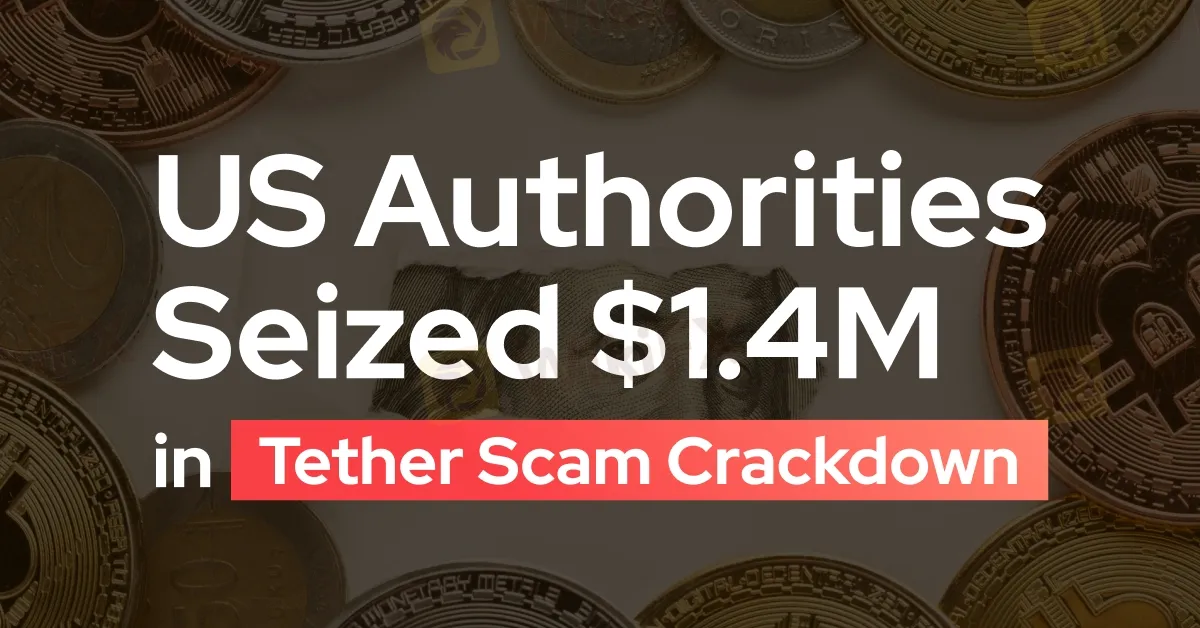简体中文
繁體中文
English
Pусский
日本語
ภาษาไทย
Tiếng Việt
Bahasa Indonesia
Español
हिन्दी
Filippiiniläinen
Français
Deutsch
Português
Türkçe
한국어
العربية
US Authorities Seized $1.4M in Tether Scam Crackdown
Abstract:In a decisive move against digital deception, U.S. authorities have seized $1.4 million in Tether (USDT) as part of a crackdown on a fraudulent customer support operation.

In a significant development, the U.S. Attorneys Office in Chicago, Illinois, has seized approximately $1.4 million in Tether (USDT) as part of a determined effort to dismantle a customer support scam operation. Executed on March 12, this move targeted funds suspected to have been fraudulently obtained, primarily affecting vulnerable elderly individuals.
The operation, spearheaded by the Department of Justice (DOJ) and the Federal Bureau of Investigation (FBI), received cooperation from Tether, a digital currency platform. The scam itself involved deceiving victims through deceptive popup advertisements, falsely asserting that their computers had been compromised.

Upon contacting the provided fake customer support number, victims were further misled into believing their bank accounts were in jeopardy. Subsequently, scammers, posing as support agents, persuaded victims to transfer their bank funds into USDT under the guise of safeguarding their assets, effectively seizing control of the victims tokens.
This case marks one of the initial instances in the United States of successfully retrieving USDT from an unhosted digital currency wallet. While the exact method of recovery remains undisclosed, an affidavit filed on January 24 suggests law enforcement was able to trace the stolen funds to five distinct wallets. These wallets were involved in a wire fraud scheme, with assets moved in small increments through intermediary addresses, likely as an attempt to launder the proceeds.
Despite Tether‘s operations being conducted outside U.S. jurisdiction, American regulators, particularly through the Office of Foreign Assets Control (OFAC), possess mechanisms to influence the stablecoin’s international operations.
A significant regulatory intervention involves Tethers association with Tornado Cash, a cryptocurrency mixer on the Ethereum network, which was sanctioned by OFAC in August 2022 for engaging in money laundering activities. This regulatory action highlights the ability of governmental bodies to indirectly impact tether usage through international cooperation and measures targeting affiliated entities.
Earlier in February, JPMorgan Chase suggested that impending stablecoin regulations could pose challenges for Tether. They argued that such regulations are likely to favour stablecoins offering greater transparency and adherence to emerging Know Your Customer (KYC) and Anti-Money Laundering (AML) standards, potentially affecting Tethers appeal. This regulatory shift could also impact the decentralized finance (DeFi) sector, where USDT plays a crucial role as collateral and liquidity.

Disclaimer:
The views in this article only represent the author's personal views, and do not constitute investment advice on this platform. This platform does not guarantee the accuracy, completeness and timeliness of the information in the article, and will not be liable for any loss caused by the use of or reliance on the information in the article.
Read more

Singapore Businessman Faces Trial in $1.1 Billion Investment Scam
A 37-year-old Singaporean businessman, Ng Yu Zhi, is currently on trial for allegedly orchestrating one of the largest investment frauds in the country's history. The scheme reportedly defrauded more than 900 investors of SGD1.5 billion (approximately US$1.1 billion) between 2016 and 2021.

Two Victims Lose Over RM660K in Investment Scams
Two individuals recently fell victim to fraudulent investment schemes in Malaysia, losing a combined total of RM660,000. Both cases highlight the persistent threat of online financial scams and the need for caution when engaging with unverified platforms.

Why the WikiFX App Should Be Installed on Everyone's Phone
Why install the WikiFX App? Get real-time global financial news, expert forex analysis, and accurate currency data all in one app for smarter trading.

Cambodia Bans Major Crypto Exchanges Over Crime Concerns
Cambodia blocks access to Binance, Coinbase, and OKX amid a crackdown on illegal crypto activities like money laundering, with mobile apps still operational.
WikiFX Broker
Latest News
Ontario launches major US ad campaign amid Trump's tariff threat
Capital.com Collaborated with Amazon in the UAE
ActivTrades Gains Regulatory License in Mauritius
Ripple’s RLUSD Stablecoin Expected to Launch in NY by Dec. 4
Businessman Pleads Guilty to $5.9M Ponzi Scheme
Apple Pay, Google Pay Eyeing Launch in the Philippines
easyMarkets Kicks Off the Start of Its Trade with the Champions Competition
Hurry up!! Octa's New Year Promotion Begins
India Currency Note Scam: Victim Lose ₹3.17 Lakh
Coinbase Integrates Apple Pay for Easy Crypto Onramping
Currency Calculator


